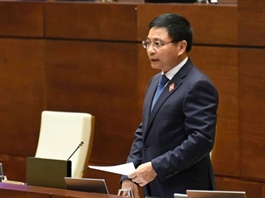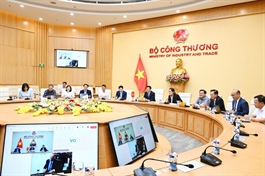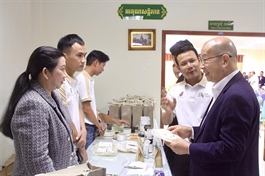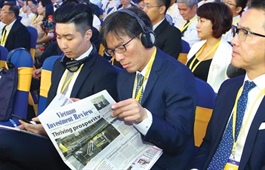The role of the press in nation-building
The role of the press in nation-building
The press is emerging as a crucial force - not only in communicating policy but also in shaping the business environment, supporting entrepreneurs and promoting transparency.
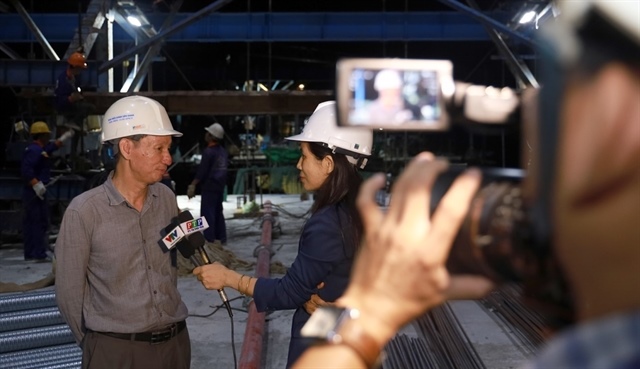
On-site interview at a factory. Journalists work to translate complex, abstract policy into powerful, relatable stories. — VNA/VNS Photo |
As Việt Nam enters a new phase of economic transformation, the private sector has been identified as a core driver of sustainable development. In this landscape, the press is emerging as a crucial force - not only in communicating policy but also in shaping the business environment, supporting entrepreneurs and promoting transparency.
Speaking at a forum on the issue, Phan Xuân Thủy, deputy head of the Central Publicity and Education Commission (CPEC) of the Việt Nam Communist Party, outlined the four strategic pillars for national development: Resolution 68 on the private economic sector, Resolution 57 on science-technology and innovation, Resolution 59 on international integration, and Resolution 66 on legal reform [which have been adopted over the past seven months by the Politburo of the Việt Nam Communist Party].
Thủy said that implementing Resolution 68 would inevitably encounter problems. In that context, journalism would serve as a crucial bridge linking policy to practice, the Party’s vision to the people’s aspirations and State institutions to the business community.
“In recent years, the press has not only captured the concerns and expectations of individuals and businesses but also conveyed the Party’s major directions promptly and effectively,” he said.
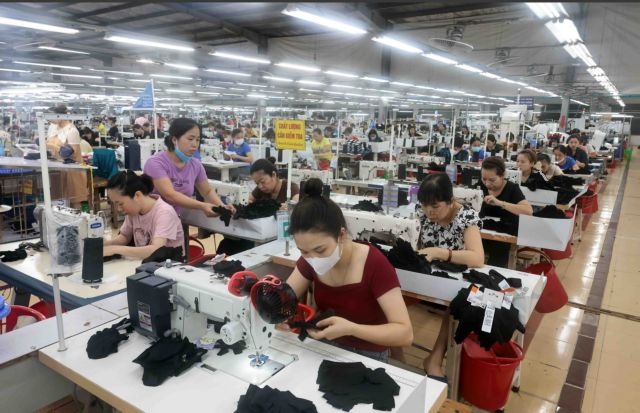
On-site interview at a factory. Journalists work to translate complex, abstract policy into powerful, relatable stories. — VNA/VNS Photo |
Despite being recognised as a key engine of economic growth, the private sector in Việt Nam still faces various constraints and has not yet achieved the competitiveness and scale expected.
“Journalists must highlight exemplary models, innovative practices and also boldly criticise bureaucracy, complacency and behaviours that hinder the improvement of the business environment,” Thủy added.
From policy to public trust
Nguyễn Ngọc Toàn, editor-in-chief of the Thanh Niên (Young People) newspaper, pointed out that "the media is no longer just a messenger, but an integral part of policymaking in a modern market economy".
“Even a well-intended policy can be misinterpreted if not clearly communicated,” he said. “Resolution 68 gained strong and rapid traction in part because media outlets conveyed its spirit through diverse platforms and accessible narratives.”
According to Huỳnh Thành Đạt, deputy head of the CPEC, the press must transform complex and abstract policy language into compelling stories that inspire action across all strata of society, from young entrepreneurs to seasoned investors.
Dương Huy Đức, deputy head of the southern office of Tạp chí Cộng sản (The Communist Review), said that the media had helped shape a positive narrative around the private sector, promoting public trust and breaking down outdated social prejudices.
“The press must continue to identify and propose solutions to implementation challenges, acting as both a watchdog and a partner in policy refinement,” he said.
"The essence of Resolution 68 lies in the shift from merely accepting the private economy to proactively protecting, encouraging, and facilitating its leadership in national development."
Experts also agreed that while the press has actively covered Resolution 68, its messaging must be more strategic and appealing, particularly to younger readers and startups.
Phạm Quý Trọng, deputy director of Local Affairs Division 3, said that coverage still lacks a long-term communication strategy and creativity in format, especially on digital platforms.
Army Colonel Phan Tùng Sơn of Quân đội nhân dân (People’s Army) newspaper emphasised the need to train journalists in economic reporting and public policy, and to adopt multi-platform approaches.
Meanwhile, Tô Đình Tuân, editor-in-chief of Người Lao Động (The Labourer), said that his publication used diverse formats to help Resolution 68 reach readers of various backgrounds, including small businesses and university students.
“Journalism must enter classrooms, reaching future entrepreneurs and communicators, cultivating a startup mindset right from school,” Tuân said.
Nguyễn Anh Đức, CEO of Saigon Co.op, called for deeper media analysis of the new orientation laid out in Resolution 68 - recognising the private economy as the most important growth driver. He urged for integrated communication efforts around all four key resolutions to help businesses align their strategies.
Constructive ecosystem
Experts also warned against the dangers of irresponsible journalism. Lưu Đình Phúc, director of the Press Department under the Ministry of Culture, Sports and Tourism, cited recent cases of "toxic media" damaging reputations and causing financial harm to legitimate businesses.
“There must be a clear line between investigative journalism and extortion. We have taken strong measures, including shutting down media outlets that breach ethics and legality,” Phúc said.
Nguyễn Đức Lợi, permanent vice president of the Việt Nam Journalists Association, echoed this sentiment, emphasising the importance of journalistic ethics and responsibility in economic reporting.
“A well-researched article can be a catalyst for growth. But a misleading one can undermine an entire sector,” he said.
Nguyễn Công Hoan, deputy CEO of Flamingo Holding Group, said that the media can be a shield and a launchpad for private businesses.
“When enterprises are open and transparent, and journalists uphold integrity, both sides benefit,” he said.
He also called on the media to highlight both successful entrepreneurs and civil servants who actively support reform and enterprise development, to foster a culture of accountability and innovation.
CPEC deputy head Đạt posed a crucial question to the media: “How do we turn Resolution 68 into a topic of public interest, into conscious action among businesses and citizens?”
"Answering this defines the mission of present-day Vietnamese journalism in nation building."
With the Party now pursuing a policy communication approach, Đạt encouraged government bodies to actively commission media to produce quality content. This approach, he said, would not only support policy implementation but also provide sustainable financial resources for public-interest journalism.
“Resolution 68 belongs to the Party, but its success depends on the entire political system. In this process, journalists and policymakers must act as comrades working towards a common goal,” he added.
- 10:35 21/06/2025



